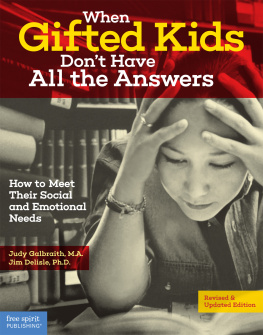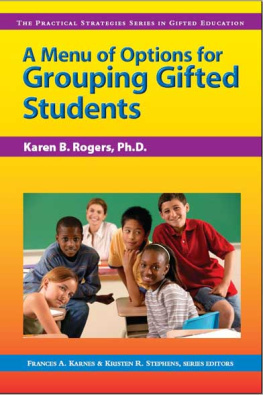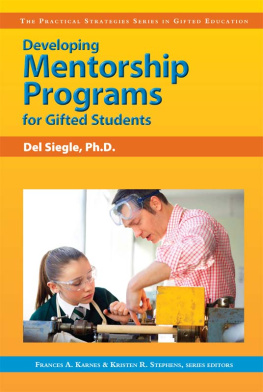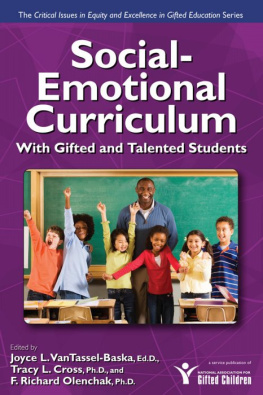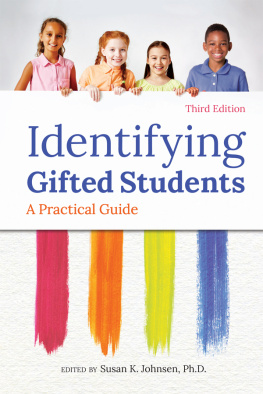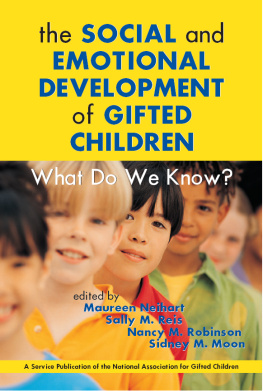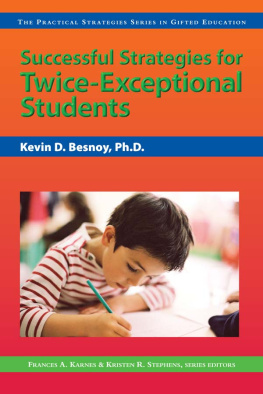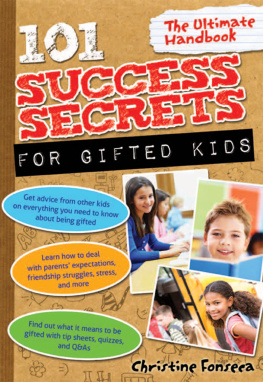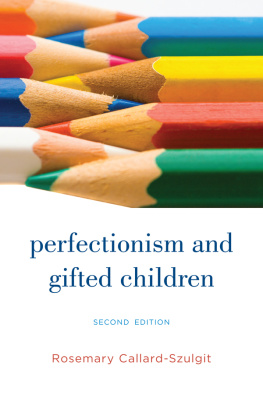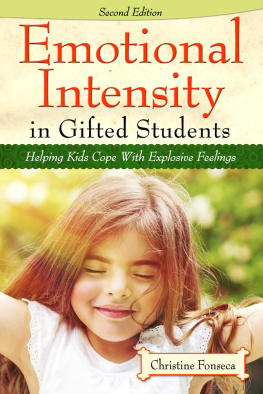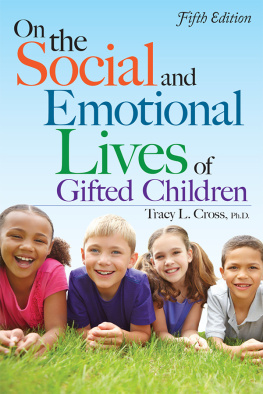
This book belongs in the canon of gifted literature. Every teacher, parent, or mental health professional working with the gifted should have a well-worn, dog-eared copy on his or her desk. Its readability, practical advice, and unique voice make it a must own. Five stars and two thumbs up.
Lisa Van Gemert, youth and education ambassador, Mensa Foundation
An excellent resource for advocatesboth teachers and parentsoffering practical and insightful strategies on how to answer information seekers and critics alike about gifted children and their education.
Lisa Conrad, founder and blogger at Gifted Parenting Support, and moderator of Twitters Global Gifted & Talented Chat (#gtchat)
Jim and Judy are on target! This book really does help students, parents, educators, and friends of gifted people understand that being gifted is truly a blessing, not a burden.
Patti Rendon, gifted and talented coordinator in Edinburg, Texas
Galbraith and Delisle successfully bridge the gap between research and practice to make a positive, practical difference for gifted young people. This text is a thorough, thoughtful, and utterly essential collection of information and actions that will benefit gifted kids and the adults in their lives.
Colleen Harsin, director of the Davidson Academy

Copyright 2015, 2002 by Judy Galbraith, M.A., and Jim Delisle, Ph.D.
All rights reserved under International and Pan-American Copyright Conventions. Unless otherwise noted, no part of this book may be reproduced, stored in a retrieval system, or transmitted in any form or by any means, electronic, mechanical, photocopying, or otherwise, without express written permission of the publisher, except for brief quotations or critical reviews. For more information, go to www.freespirit.com/permissions.
Free Spirit, Free Spirit Publishing, and associated logos are trademarks and/or registered trademarks of Free Spirit Publishing Inc. A complete listing of our logos and trademarks is available at www.freespirit.com.
Library of Congress Cataloging-in-Publication Data
Galbraith, Judy.
When gifted kids dont have all the answers : how to meet their social and emotional needs / Judy Galbraith, M.A. and Jim Delisle, Ph.D. Revised & updated edition.
1 online resource.
Previous edition entered under: Delisle, James R., 1953
ISBN 978-1-57542-517-7 (Web PDF) ISBN 978-1-63198-014-5 (ePUB)
ISBN 978-1-57542-493-4 (paperback) 1. Gifted childrenEducationUnited States
Psychological aspects. 2. Classroom environmentUnited States. I. Delisle, James R., 1953- II. Title.
LC3993.2
371.95dc23
Free Spirit Publishing does not have control over or assume responsibility for author or third-party websites and their content. At the time of this books publication, all facts and figures cited within are the most current available. All telephone numbers, addresses, and website URLs are accurate and active; all publications, organizations, websites, and other resources exist as described in this book; and all have been verified as of November 2014. If you find an error or believe that a resource listed here is not as described, please contact Free Spirit Publishing. Parents, teachers, and other adults: We strongly urge you to monitor childrens use of the Internet.
Edited by Meg Bratsch, Pamela Espeland, and Alison Behnke
Cover and interior design by Michelle Lee Lagerroos
Cover photo Getty Images; back cover photo Serrnovik | Dreamstime.com.
Free Spirit Publishing Inc.
Minneapolis, MN
(612) 338-2068
www.freespirit.com
Free Spirit offers competitive pricing.
Contact for pricing information on multiple quantity purchases.
Dedication
This book is dedicated to the devoted advocates of gifted youth whose efforts often go unnoticed or are undervalued. There may be days when youre not sure if your work is making any difference, and you may feel discouraged by a society that largely misunderstands the importance of what you do. I hope that, in some small way, this book encourages and helps you to carry on the good fight. Remember, your heart knows the truth: Gifted kids are worth your efforts. They need and appreciate your support, advocacy, challenge, and caring.
Judy Galbraith
The first edition of this book was dedicated, wholly and completely, to my son, Matt, whose love and laughter I cherish. I see no reason to change that dedication, but simply to add someone to it: his wife, Jen, who completes him (and our family) in meaningful and beautiful ways.
Jim Delisle
Acknowledgments
As we were preparing the final copy for this book, we were both struck by the number of letters, anecdotes, and personal reections that are included in it. Some were written by colleagues we have known for years, others by students who were in our classes or who crossed our lives for only a brief moment, and still more by individuals close to our hearts due to the personal relationships we have shared with them. In all cases, their words and reections have added immeasurably to our understanding of giftedness. Even more, though, these excerpts represent both the friendships and professional relationships that have been forged between us and so many generous others. To every individual who has helped make this book more complete, more grounded, we thank you with much sincerity.
List of Reproducible Pages
Download these forms at www.freespirit.com/WGKDHA-forms.
Introduction
Gifted kids are so much more than high grades and test scores. You probably know that already; thats why youre reading this book. But for teachers just starting out (or burning out, or overwhelmed with the day-to-day concerns of their job), its sometimes difficult to see past all that achievement and potential to the child or adolescent who may be filled with anxiety, pressured to be perfect, lonely, alienated, confused, and unsure of what the future might bring.
We can both remember the specific incidents that first called our attention to gifted kids social and emotional needs.
Judy: Early in my career as a gifted education specialist I worked with teens. One day, three boys hung around after class, and I overheard them talking. Now I get to go be my familys identified patient, one said. Another asked, Have you ever taken a Rorschach test? The third said, Im seeing a psychiatrist. I suddenly realized that all three students had personal experience with mental health issues, and I wondered: What about the others? It was a wake-up call for me. Not long after, another of my students attempted suicide. When I looked at my program with new eyes, I saw that it was based entirely on meeting gifted kids academic needs. It occurred to me that if a students mental health is off-center significantly, or even a little, what point is there in trying to push academic challenge when thats usually the easy part of life for gifted kids? I made it my personal mission to educate myself about mental health, and to balance my academic program with life skillslearning about oneself and others.
Jim: Greg entered my life and my classroom at the same time. A fifth grader, he was fascinated by anything intellectual, and his sensitivity often caused him to see life from an altruistic angle seldom observed in boys his age. He drove his teachers nuts, though. He seldom finished anything he started, because once his fascination with a topic was sated, he felt it was time to move on. For two years, Greg was enrolled in my gifted program, and for two years, I had to fight to keep him there. He wasnt your stereotypical highachieving gifted child, but he was, indeed, a gifted child. I came to realize that the greatest needs he had were not in academics, but in the social and emotional realms of growing up gifted. Greg, and others like him, have guided my life ever since, and they have shown me the importance of looking beyond high achievement and glossy projects to find the gifted child beneath the academic veneer.

